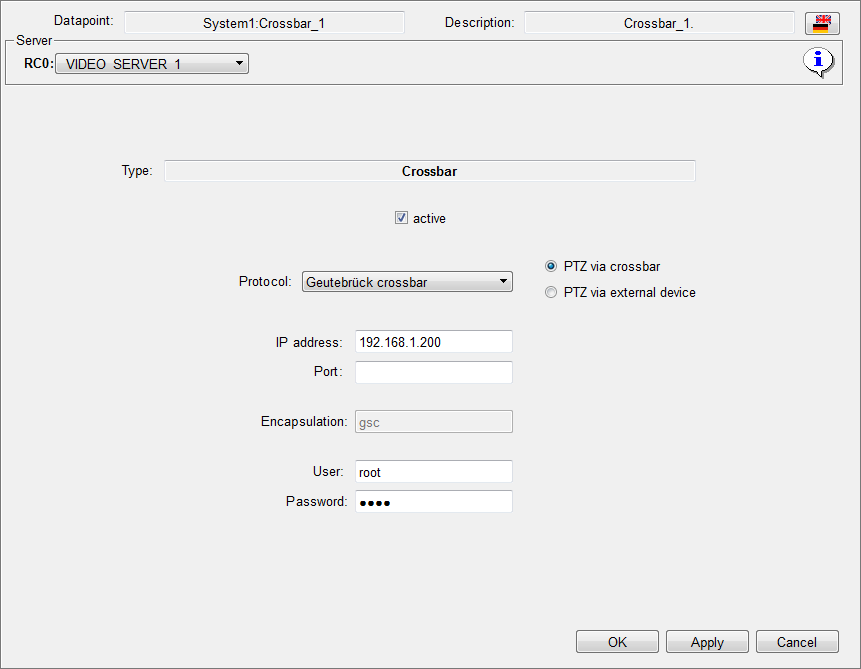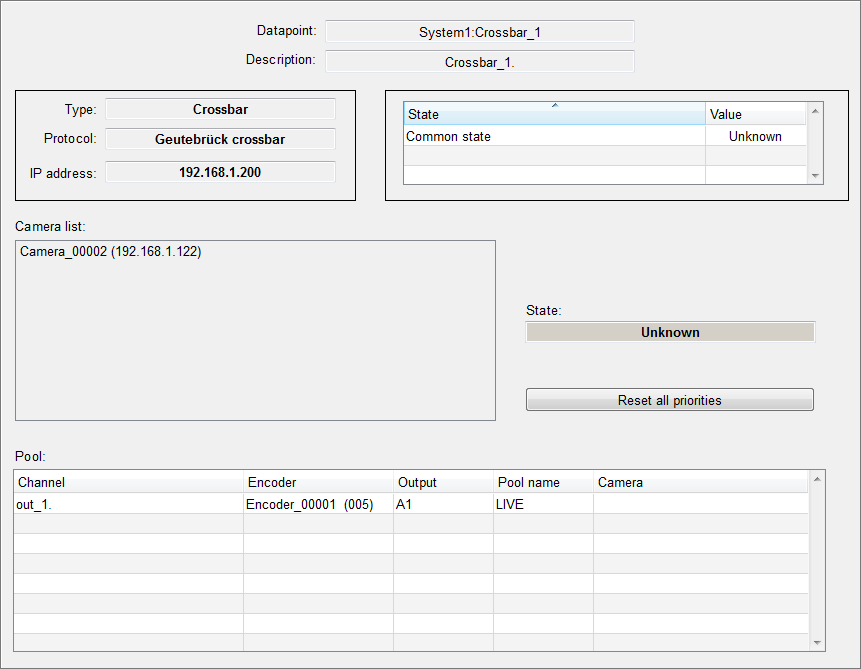Crossbar
|
VIDEO OA allows to manage cameras which are connected to an external crossbar (see also Configuration of analog cameras via external crossbar). Encoders are used as interface between external crossbars and VIDEO OA. They convert analog outputs to digital video streams which can be processed by VIDEO OA. Such encoder channels are named as encoder pool channels. It does not matter if the crossbar is analog or digital. At first, signals must be taken from the external crossbar analog and be provided to an encoder pool channel. The single encoder pool channels can be grouped by using pool names. Therefore it is possible to connect specifically to certain encoders ControlThe crossbar is controlled via a TCP/IP interface. The used protocol depends on the deployed crossbar. If the external crossbar can only be controlled via a serial interface, a TCP/IP gateway must be used. Camera functionsThe following camera functions are available for connected cameras in VIDEO OA:
Moreover, two additional data point types are available:
The sum of data points of type VIDEO_OA_ENCODER_POOL_CHANNEL that are configured for a crossbar and that have the same pool name forms an encoder pool for this crossbar. It is possible to define an arbitrary number of pools with any size for each crossbar. The interface to the crossbar must provide the following commands:
Every encoder supported by VIDEO OA can be used as pool encoder (e.g. Bosch, Axis, Moxa). The camera status depends on the status of the crossbar connection. E.g. if the control connection to the crossbar is disrupted, the status of all related cameras is disrupted as well. Example
50 analog cameras (camera K1 to K50) are connected to the analog crossbar Crossbar_1 in this example. Five outputs (A1 to A5) of the crossbar are connected to two encoders. The outputs A1 to A4 are connected to encoder 1, output A5 is connected to encoder 2. Alarms shall be displayed via encoder 2. As long as no alarm display is present the encoder can be used for other connections as well. Creating a new objectOpen the context menu with a right mouse click on Crossbar and select create new object. The following window is opened: 
After entering the crossbar name the configuration panel will be opened. Configuration
The following crossbar types are available:
Defines if the crossbar can process PTZ commands for the connected cameras PTZ via external deviceIf this option is set, an external device must be configured for the PTZ control of the camera OverviewThis panels shows the configuration of the crossbar. It displays the type, protocol, IP address, status as well as connection between encoder, crossbar and encoder pool channels.
If a camera of the crossbar is displayed, an encoder pool channel is occupied. The corresponding camera name is shown in the camera column of the Pool table. In case that no priorities are given for connections, all channels are equal. If all encoder pool channels are occupied it is not possible to display a further camera of the crossbar without a priority. Cameras which are not displayed because of missing encoder pool channels are indicated by the status connection establishment. As soon as a encoder pool channel is available the camera is automatically displayed. The button "reset all priorities" resets the priorities so that all cameras and all pools are equal. PriorityIt is possible to set priorities in order to specifically display cameras via certain encoder pool channels or to replace other cameras. A priority setting can be defined permanent or till the next display. In case of a permanent priority setting it will remain until its deletion. It is recommended to always use permanent priority settings in case of specifically alarm displays, so that the display remains via the chosen encoder pool, even if the camera has to reconnect because of connection issues. The priority settings can be defined via the camera operating panel or CTRL functions (VIDEO_OA_deletePrioritySettingsForCamera(), VIDEO_OA_setCameraPriorityForPoolname(), VIDEO_OA_deletePrioritySettingsForSwitchingMatrix()) |
Implementation of alarm display
In the previous configuration example all alarm displays shall be made via encoder 2 (pool name ALARM). Therefore, proceed as follows:
-
Delete all priority settings of the crossbar
-
Set the priority for the alarm camera to the pool name ALARM
-
Display the camera on an EWO or a display monitor
The camera is displayed via this encoder channel until step 1-3 are repeated. Step 1 removes the priority of the displayed camera. The camera is replaced by the new alarm camera in step 3.






